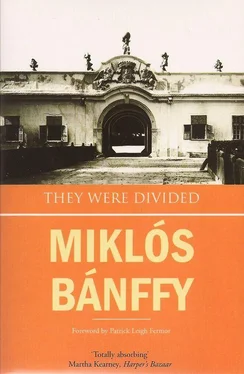All his life lay before him, his whole past, everything. Even Kozard, where Laszlo lay buried. He wanted to say farewell to him too, and he searched the distance through his binoculars for a sight of the manor house at Kozard and the Gyeroffy family vault just above it. It lay at the most northerly point of the Szamos valley; and there it was, a tiny patch of white, a little triangle on the left bank.
A deep bitterness came over him as he stood there alone, high above the world he had known and which was now doomed to perish.
In his mind’s eye he saw too the whole generation to which he belonged, that generation, still young, which had grown up in that long period of peace that had followed the troubled years before 1867. It was the men of his generation that had come after those years of reform and who were the successors of such men as Deak, Eotvos, Miko, and Andrassy, who had lived through the nightmare of the revolution and the repression which followed, who had learned from their tribulations and who had known how to meet troubles with calm and moderation.
But this generation, Balint’s own, had drifted farther and farther away from the practical wisdom of their forebears. Reality had been gradually replaced by self-deception, conceit and sheer wrong-headed obstinacy.
Everyone was guilty, all the upper strata of Hungarian society.
He saw before him the entire class of great land-owners, spoilt by an arrogance that had led them to neglect the good management of their estates, preferring to vie for pompous offices of state and political advantage. He saw the professors of history, who thought only of the revolutionary struggle against the Habsburg domination and who denigrated those who would have encouraged the Hungarian people to self-knowledge and hard work, with the result that the minds of the young had been filled only with illusory ideals and chauvinistic slogans. From the turn of the century his generation had been fed with self-congratulatory theories which had so misled it that any criticism was at once dismissed as unpatriotic.
He saw before him the magnates and noble families who thought only of social prominence, who forgot their European affiliations and threw the weight of their great fortunes and moral influence behind all that nationalistic nonsense of which they did not believe a word and which, in consequence, had poisoned the nation’s politics.
All this he saw before him, just as if he were looking back from beyond the grave.
Now this beloved country would perish, and with it most of his generation. It would perish with this meaningless war; for until now those rousing battle-cries had only meant a call to wars of words and speechifying and argument; and the repeated exhortations to hold out to the last man had only meant not to speak until the end of a debate, and were far from the true murderous reality.
Now this land would perish, and with it that deluded generation that had given importance only to theories, phrases and formulae, that had ignored all reality, that had chased like children after the fata morgana of mirage and illusion, that had turned away from everything on which their strength was based, that denied the vital importance of power and self-criticism and national unity.
One virtue alone remained: the will to fight.
And that too would prove in vain.

The town below was now in darkness. Night had fallen.
Only the sky in the west flamed with life.
Long shreds of cloud floated high; ash-coloured strips with shining tassels touched the far horizon. Around and beneath them fire, everywhere fire. The whole world beyond the horizon seemed to be in flames. On the line of the horizon itself the colour was blood-red, rising in the blinding heat of tongues of fire, fiery tears along its whole length as if the whole universe wept burning ash into an ocean of blood. Below the red inferno of the sky were etched heavy, dark-lilac-coloured mountain peaks, their hard-edged contours merging into some endless monolith; they were the mountains of Gyalu and the Magura and, behind them, the mighty Vlegyassa itself.
Vast stony ridges that slanted upwards to the sky.
Giant coffins, a people’s tombstones.
In motionless majesty they stood there beneath a world in flames.

The car arrived.
Balint started the descent from the summit.
THE END
Bonczhida, May 20th, 1940













